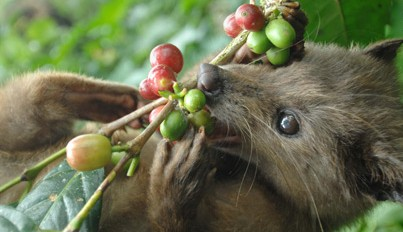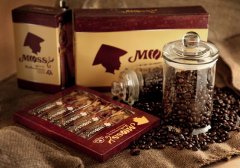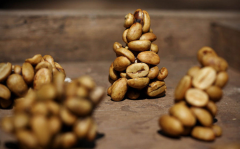Introduction to the Origin and characteristics of Musk Coffee Coffee
1 Coffee principle
Kopi Luwak civets like to choose the most ripe, sweet, juicy coffee fruits in coffee trees as food. The coffee fruit passes through its digestive system, and only the pulp on the outside of the fruit is digested, and the hard coffee beans are then excreted intact by the civet's digestive system.

In this way, in the process of digestion, the coffee beans have an unparalleled magical change, the flavor tends to be unique, the taste is particularly mellow, and the rich, round and sweet taste is also incomparable to other coffee beans. This is due to the fact that the civets' digestive system destroys the protein in the coffee beans, making the coffee much less bitter and increasing the round taste of the coffee beans.
Because wild civets are obviously better at selecting good coffee fruits, this kind of coffee has outstanding characteristics.
2 Coffee source
Kopi Luwak Kopi Luwak, produced in Indonesia, is one of the most expensive coffee in the world. Indonesia grows a lot of coffee crops, including wild animals called civets, omnivores, pointed mouths and dark gray fur. The favorite food is fresh coffee beans, which are fermented and digested in the body and eventually excreted by cats. Feces are grains of coffee beans and become the most expensive feces in the world. Because the quantity is very rare, so the price is very expensive. Civets are found in Indo-China, India (northeast), Bangladesh, Bhutan, Sikkim, Nepal and Kashmir, but only Sumatran civets, or Indonesian civets, can produce Kopi Luwak.
After processing and baking, Kopi Luwak has become a luxury coffee drink and spread to luxury kingdoms around the world. Local coffee farmers, in pursuit of high profits, bring wild civets home to raise them so that they can produce more Kopi Luwak. However, the Kopi Luwak produced by breeding civets will be much worse in color and taste. Even so, the output of this kind of coffee is still very rare, and it is not affordable for all people who like coffee.
This coffee comes from the excrement of an animal called civets (commonly known as civets in Indonesia). Although it comes from smelly poop, it is full of sweetness and indescribable sweetness. This wild musk cat likes to eat fat and pulpy coffee fruits, but the hard hard nuts (raw beans) are indigestible and are excreted with feces. After being cleaned, they become Kopi Luwak coffee raw beans! So many people call it "cat shit" coffee. The Indonesians found that the coffee beans fermented by the civets' intestines and stomach are particularly thick and mellow, so they collect the civets' feces, sift out the coffee beans and brew them to drink. Because the yield is rare and the fermentation process is unique, the flavor is very different from that of ordinary coffee. Traditionally, coffee fruit is washed or sun-treated to remove the peel, pulp and sheep skin, and finally take out the coffee beans. However, Luwak uses natural fermentation in the body to remove the coffee beans, so it has a special flavor.
It is said that coffee farmers in early Indonesia regarded civet cats that ate ripe coffee fruits as mortal enemies, but at some point someone began to think of picking coffee beans from the civet droppings to make coffee with unique flavor. Coffee experts everywhere have tried and were amazed. Since then, local farmers spend a lot of time collecting civet droppings in the forest every day during the coffee ripening season.
3 the course of development
Kopi Luwak first introduced Kopi Luwak coffee to the United States of Montanus (M.P. Mountanos) pointed out that when I heard about this fermented coffee in my body, I thought it was a joke of the industry, but I didn't take it seriously. later, I saw a special report on Kopi Luwak in National Geographic Magazine and became interested in her. it took seven years to find a stable supply and began to introduce a small amount to the United States. What's the flavor of this coffee? Generally speaking, Indonesian coffee has the taste of mud and traditional Chinese medicine, and its consistency is the highest in all continents, but Kopi Luwak has a stronger taste and consistency, which is almost close to syrup, and its flavor is very special. If you don't like Indonesian coffee in the first place, you must hate Kopi Luwak even more. If you prefer the fishy smell of aged beans, you may love this alternative coffee. Experts who have tasted Kopi Luwak have put forward a polarized evaluation, and some people compare it to the best coffee in the world. Although it is the best, but whether you are willing to spend thousands of yuan to drink a cup of Kopi Luwak is your personal preference.
4 introduction of features
The whole process of making Kopi Luwak
Coffee beans generally go through the process of shell fermentation, coffee beans in the civets' intestines, special bacteria provide a unique fermentation environment, the flavor becomes unique, particularly thick and mellow. The coffee beans fermented by civets' intestines and stomach are very thick and mellow.
"Kopi Luwak" was once a tribute from Indonesia to the Dutch royal family. At that time, the industry regarded the coffee with the name "cat shit" as a joke, and people didn't get interested in the Kopi Luwak until it was specially reported in National Geographic magazine.
High price
The Kopi Luwak Initiative is the least produced coffee in the world. A bag of 50 grams of coffee beans costs more than 800 yuan, and only 5 cups of coffee can be brewed. In other words, the price of a cup is about 200 yuan. The civet coffee gift box produced by Fireboat Group, Indonesia's largest coffee supplier, sells for 600,50g at Shangpin Cafe with extremely luxurious packaging, while the asking price for 100g is more than 2000 yuan, and the global annual output in the wild does not exceed 400kg. Today, villagers in these areas not only collect wild Rwaka feces, but also begin to raise Rwaka in captivity. Large pots of picked coffee cherries were placed in front of Rwaka, and the hungry Rwaka had no choice but to eat all the coffee cherries. The taste of Rwaka coffee produced in this way is naturally greatly reduced. "scarcity is precious", which has led to the high price of Kopi Luwak, a rare treasure. I'm afraid you'll have to prepare £50 for a cup of coffee, and you may not be able to find it everywhere.
★ A cup of coffee made from 12 grams of cat poop coffee powder sponsored by Fireboat Group at the 2010 Shanghai World Expo costs 380 yuan, which is limited to 12 cups a day in short supply.
★ in Bali, a cup costs more than 200,000 rupiah, equivalent to more than RMB 150.
★ in the United States, 1 kilogram of cat poop coffee beans is as high as USD 1200. It is always around USD 1000 in the international market.
★ in England, a cup costs 50 pounds (RMB 500).
Made by Kopi Luwak, "Kopi" means coffee in Indonesian, and "Luwak" is the name commonly known by Indonesians as "civet". It is said that the coffee produces no more than 500 pounds a year, and the price per pound ranges from $300 to $800, depending on the year, because there is not a fixed production every year.
In the international market, Luwak coffee has always been a veritable luxury, and one of the main reasons is that it is not made by people but by wild animals. Traditionally, the coffee fruit is washed or sun-treated, removing the skin, pulp and sheep skin, and finally taking out the coffee beans, but Luwak coffee is made by natural fermentation in wild animals. What's more, these wild animals are found only on small islands like Indonesia, and their time and place are mysterious, and their number is decreasing day by day. Although Indonesia has claimed that the number of "civets" has rebounded steadily through protection and artificial feeding, the temptation of human taste buds, which depends on its digestive system, cannot be compared with products of the industrial era.
"civets" are omnivores. They are withdrawn by nature and like to walk at night. They live in tropical rain forests, subtropical evergreen broad-leaved forests, mountain thickets or hills, mountains and grasses below 2000 meters above sea level. Its food includes small beasts, birds, amphibians and reptiles, crustaceans, fruits and seeds of insects and plants. The civet likes to choose the most mature, sweet, juicy coffee fruit in the coffee tree as food, while the coffee fruit passes through its digestive system and is digested only by the pulp on the outside of the fruit. The hard coffee beans are then excreted intact by the civets' digestive system. This is the "natural fermentation method" that was once scoffed by Americans. It is said that when Americans heard about this way of making coffee, it was regarded as a fantasy, and it was not until it was reported by National Geographic that they became interested in it.
The world's most luxurious coffee, the world's most expensive coffee, the world's rarest coffee.
There are always people who describe Kopi Luwak in this way, which sounds like a boring anecdote
I can't help thinking of Oscar Wilde's words.
People always pay too much attention to the price of things, but often ignore their own value. Forget the rumors of clumsy and useless embellishments
Let's start a magical journey to Kopi Luwak. -- Caffeine.
Unique flavor
Indonesian Kopi Luwak Indonesian coffee has the taste of earth and traditional Chinese medicine, and its consistency is the highest in all continents. But "Kopi Luwak" has a heavier earthy smell, and its consistency is closer to that of syrup. It has a very special flavor. After drinking, there will still be a touch of peppermint cool feeling in the mouth, which is the "exclusive taste" that ordinary coffee does not have. After drinking a cup, take a deep breath or take a sip of cold water, you can obviously feel cool from mouth to throat. It's like I just ate a mint lotion.
Experts say there is a gland near the sexual organs of the Indonesian "civet" that secretes milky oil, which has always been a precious raw material for the perfume industry. Even Shakespeare's play King Lear has this dialogue: "Please give me some civet oil to stimulate my inspiration." Others said, "this coffee is unique and is a specialty of Indonesia." Drink it, it's like finding a diamond in a stone. " Because the wild "civets" are obviously better at selecting good coffee fruits, so that this kind of coffee has outstanding characteristics.
5 introduction of place of origin
The kopi luwak coffee brand must be produced more than 1000 meters above sea level in the Sumatra plateau; not that many of the outside are produced in Vietnam or in other plains of Indonesia, where many Indonesian farmers produce coffee beans from captive civets. Nowadays, most of the Kopi Luwak coffee claimed on the market are non-Kopi Luwak fakes, and they can be divided into these forms: the first is to claim that it is collecting coffee beans on trees in coffee estates that have been infested by luwak, which are called Kopi Luwak coffee, not really coffee beans that can be digested by Luwak; moreover, coffee that is fried with spices; otherwise, it is simply known as Kopi Luwak coffee to fish for fame and raise the price. Moreover, there is no favorable certificate for the domestic coffee industry to show to consumers for verification, and products often have to be obtained through agents in the United States, Canada, the United Kingdom or Australia, rather than directly imported from Indonesian origin, resulting in uneven coffee quality.
Important Notice :
前街咖啡 FrontStreet Coffee has moved to new addredd:
FrontStreet Coffee Address: 315,Donghua East Road,GuangZhou
Tel:020 38364473
- Prev

Development of Coffee production and processing in Vietnam Central Plains Coffee Highland Coffee Moche Coffee
Vietnamese coffee (c ph, literally iced coffee) is a kind of dripping coffee. The aroma is strong, the sour taste is light, the taste is smooth and moist, the fragrance is slightly bitter, the aroma is rich, refreshing and refreshing. Representative products are moossy Coffee, Central Plains Coffee, Saigon Coffee (SAGOCAFE), Highland Coffee. The geographical location of Vietnam is very favorable for coffee cultivation.
- Next

Kopi Luwak Coffee Brand method introduction production method production skills brewing method
1 Coffee brand kopi luwak Coffee brand 100% guarantee pure wild kopi luwak, produced in Sumatra, Zawa, and Sulvish, is part of the 13677 islands of Indonesia. Kopi Luwak brand is the only officially recognized brand by the Indonesian government, and it is deeply loved by coffee lovers for its unique fruity aroma and long aftertaste. Kopi Luwak definitely counts.
Related
- Detailed explanation of Jadeite planting Land in Panamanian Jadeite Manor introduction to the grading system of Jadeite competitive bidding, Red bid, Green bid and Rose Summer
- Story of Coffee planting in Brenka region of Costa Rica Stonehenge Manor anaerobic heavy honey treatment of flavor mouth
- What's on the barrel of Blue Mountain Coffee beans?
- Can American coffee also pull flowers? How to use hot American style to pull out a good-looking pattern?
- Can you make a cold extract with coffee beans? What is the right proportion for cold-extracted coffee formula?
- Indonesian PWN Gold Mandrine Coffee Origin Features Flavor How to Chong? Mandolin coffee is American.
- A brief introduction to the flavor characteristics of Brazilian yellow bourbon coffee beans
- What is the effect of different water quality on the flavor of cold-extracted coffee? What kind of water is best for brewing coffee?
- Why do you think of Rose Summer whenever you mention Panamanian coffee?
- Introduction to the characteristics of authentic blue mountain coffee bean producing areas? What is the CIB Coffee Authority in Jamaica?

